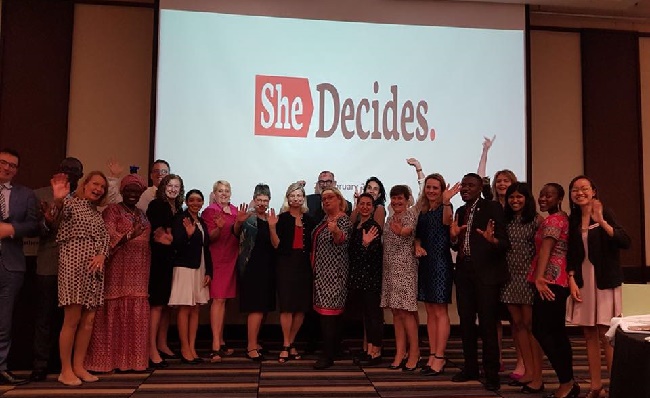SheDecides has grown into a global power

Photo: facebook.com/SheDecidesGFI/
Sixteen million young girls and teenagers give birth each year – most of whom live in low-income countries. Unwanted and forced pregnancies can be prevented. But the right to contraception and safe abortions is currently under attack.
This is why one year ago today, Sweden and four other countries launched SheDecides – a movement that has grown into a global power for the right of all women and girls to decide over their own bodies.
In all, as many as 22 million women and girls around the world have unsafe abortions each year. Abortions account for almost 13 per cent of maternal mortality around the world. Studies by the World Health Organisation show that prohibiting and limiting legal abortions does not result in fewer abortions; it instead results in more women and girls dying as a result of unsafe, illegal abortions. Even so, one of President Trump’s very first decisions on taking office last year was to reinstate and expand the Mexico City Policy. This decision prevents US aid from providing funding to foreign NGOs that perform or recommend abortions, or even provide information about the right of women and girls to have an abortion.
The Mexico City Policy has had the impact that President Trump intended. The US State Department recently published a report on implementation of the policy. The report states that to date, of more than 700 contracting partners, only four US partners and twelve subcontractors in the health field have chosen not to renew their agreements. Most of them were forced to sign agreements prohibiting them from working on the issue of abortion.
The policy impacts all organisations working on health issues that receive US aid, and so not only affects access to abortions but also access to maternal health care and contraceptives. Civil society organisations – an important advocate of women’s rights – are forced into silence. This is why the Mexico City Policy is also known by the fitting epithet ‘Global Gag Rule’. Many international partners and friends of the Swedish Association for Sexuality Education bear witness to a divided civil society in which everyone is forced to choose sides: stand up for the right to abortion and lose US funding, or consciously remain silent and witness the lives of women and girls being put at risk due to unwanted pregnancies and unsafe abortions.
One year ago today, Sweden, Belgium, Denmark and the Netherlands jointly launched the SheDecides initiative – a movement to increase mobilisation of political forces throughout the world and increase financial support to sexual and reproductive health and rights (SRHR). The SheDecides movement inspires hope that, together, we can bring about change. To date, more than 40 000 people have become Friends of SheDecides and taken a stand for the right of women and girls to decide over their own bodies. During the first year, over USD 445 million was raised and several countries, including Sweden, have announced that they will further increase their support in 2018.
Even before the Mexico City Policy was introduced, there was an enormous need of political and financial support to the sexual and reproductive health and rights of women and girls. For example, funds corresponding to SEK 100 billion are needed annually to give all girls and women in developing countries access to modern contraceptives and contraceptive advice. Abortions are totally banned in six countries around the world, and abortion legislation in another sixty or so countries is restrictive or very restrictive. The consequences of President Trump’s policy, which include reduced access to contraceptives and increased maternal mortality, are not yet clear.
One of the most effective ways of limiting the empowerment, participation and influence of women and girls is to limit their access to sexual and reproductive health and rights. Lack of knowledge of how the body works, child and forced marriages, discriminatory legislation and gender-stereotyped values and standards limit the opportunities for women and girls to go to school, participate in working life, make their voices heard and gain political influence. Poorer access to education and an income in turn affects the total economic development of entire countries and regions.
The right of women and girls to decide over their own sexuality and reproduction is a top priority in development cooperation. The Swedish Government and the Swedish Association for Sexuality Education have different roles in this work, but we stand up for the full enjoyment of human rights by women and girls.
We encourage everyone – individuals, companies and civil society organisations – to become Friends of SheDecides on shedecides.com. Now more than ever, Sweden’s voice is needed.
Isabella Lövin
Minister for International Development Cooperation and Climate
Hans Linde
Chair, Swedish Association for Sexuality Education

